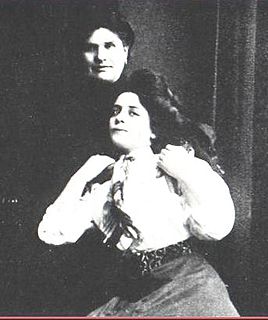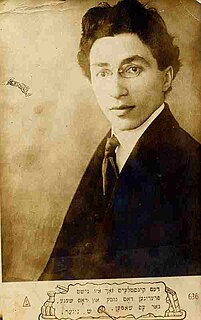Related Research Articles

Yiddish theatre consists of plays written and performed primarily by Jews in Yiddish, the language of the Central European Ashkenazi Jewish community. The range of Yiddish theatre is broad: operetta, musical comedy, and satiric or nostalgic revues; melodrama; naturalist drama; expressionist and modernist plays. At its height, its geographical scope was comparably broad: from the late 19th century until just before World War II, professional Yiddish theatre could be found throughout the heavily Jewish areas of Eastern and East Central Europe, but also in Berlin, London, Paris, Buenos Aires and New York City.
Yankev Shternberg was a Yiddish theater director, teacher of theater, playwright, avant-garde poet and short-story writer, best known for his theater work in Romania between the two world wars.
The Vilna Troupe, also known as Fareyn Fun Yiddishe Dramatishe Artistn and later Dramă şi Comedie, was an international and mostly Yiddish-speaking theatrical company, one of the most famous in the history of Yiddish theater. It was formed in and named after the city of Vilnius (Vilna) in the Russian Empire, later capital city of Lithuania. Distinctly Modernist, and strongly influenced by Russian literature and by the ideas of Konstantin Stanislavski, their travels in Western Europe and later to Romania played a significant role in the dissemination of a disciplined approach to acting that continues to be influential down to the present day.
Osip Mikhailovich Lerner, also known as Y. Y. Lerner, was a 19th-century Russian Jewish intellectual, writer, and critic. Originally a maskil—a propagator of the Haskala, or "Jewish Enlightenment"—he became a pioneer in the fields of Yiddish theater and folklore, as well as literary criticism. In his later years, he converted to Christianity and wrote a book denouncing Jews.

Alexander Asro was a film and theatre actor. He was a member of the Vilna Troupe and appeared in several comedic films in the United States.

Samuel Joseph Fuenn, also known as Rashi Fuenn and Rashif (רשי״ף), was a Russian Hebrew writer, scholar, printer, and editor. He was a leading figure of the eastern European Haskalah, and an early member of Ḥovevei Zion.

Moishe Broderzon was a Yiddish poet, theatre director, and the founder of the Łódź literary group Yung-yidish.

Jonas Turkow was an actor, stage manager, director and writer. He received the Itzik Manger Prize for his contributions to Yiddish letters.
Henech Kon or Henryk Kon was a Polish composer and cabaret performer.

Diana Blumenfeld was a folksinger, pianist, and actress.

Avrom Reyzen, known as Abraham Reisen, was a Yiddish writer, poet and editor, and the elder brother of the Yiddishist Zalman Reisen.
Lola Folman (1908–1979) was a Polish Jewish singer and composer popular in Poland in the 1930s. Folman was a folk singer and soloist with the Moshe Shneur Choir in Warsaw and later a composer and performer in kleynkunst and revi-teater. Folman married lyricist Yitskhok Perlov.

Clara Young was a Yiddish theatrical actor. Born to parents who loved the stage, she spent her early years in a home that housed rehearsals of traveling Yiddish theater troupes. After her father's death the family went to America, where she soon joined the Tantsman company and went to Boston, there to Zolotarevski's troupe in Montreal, thence to Toronto and to Morris Finkel's theater in Philadelphia.

Aaron Lebedeff (1873–1960) was a Yiddish theatre star, born in Gomel, Belarus.
Shloyme Prizament (1889-1973), Jewish composer, actor in the Yiddish theater, and badkhn, son of Moyshe Prizament.
Kasriel Broydo (1907–1945) was a songwriter, singer and coupletist. He was born in Vilnius and played in various troupes and marionette-theaters. His lyrics and songs, like Hot zikh a zun aza breyte tseshpreytn, were the folk songs of his place and time.

Władysław Godik was a Polish Jewish singer, actor and director in Polish, Russian, and Yiddish theatre. Born in Zlatopil near Kyiv, Ukraine, he moved with his family to Warsaw, where he did two semesters in the veterinarian institute.

Shmuel Niger was a Yiddish writer, literary critic and historian and was one of the leading figures of Yiddish cultural work and Yiddishism in pre-revolution Russia.

Mordecai Aaron Günzburg, also known by the acronym Remag (רמא״ג) and the pen name Yonah ben Amitai, was a Lithuanian Jewish writer, translator, and educator. He was a leading member of the Haskalah in Vilna, and is regarded as the "Father of Hebrew Prose."
References
- ↑ Zalmen Zylbercweig, Leksikon fun Yidishn teater, Book two, 1500-1503,